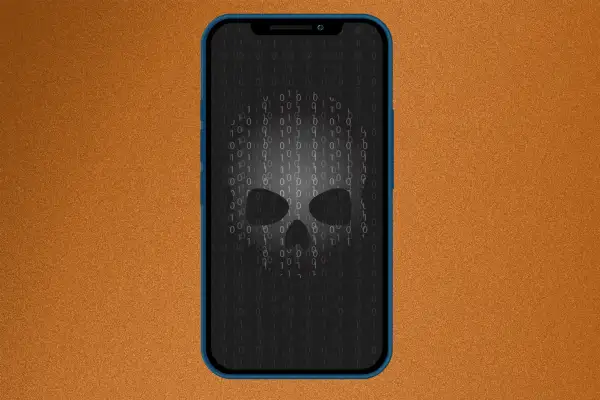Can iPhones Get Viruses?

If you have an Apple acolyte in your life, you’ve probably heard the popular, and incorrect, refrain that "Macs Don't Get Viruses."
Back in the 80s’, windows-based personal computers came on the market a few years before Apple computers, making PCs an easier target for cybercriminals. Over the years, though, the ubiquity of Mac computers has made them more attractive to hackers. According to a study from the software company Malwarebytes, the average number of malware threats detected on Macs in 2019 was nearly twice the number detected on PCs.
In other words, the notion that Apple products are impenetrable to hackers has been thoroughly debunked. And that includes the iPhone.
Our smartphones—Apple, Android, or otherwise—are more vulnerable to cybersecurity threats than most people think. Here's what you need to know to stay safe.
What's the threat?
First things first: “Malware” and “virus” are two terms that are often used interchangeably, but there are important distinctions.
Malware is the term for any harmful software that can infect a computer or smartphone. A virus, on the other hand, is a form of malware designed to spread across programs like Microsoft Outlook or Microsoft Word — and, eventually, your entire device. Both threats are designed for a variety of purposes, from stealing your identity to ruining your computer (and your day).
"Viruses need to replicate themselves to spread,” says Kristen Bolig, founder of the online security resource SecurityNerd.
Apple’s operating system, iOS, makes it tough for viruses to take over a phone since each app lives in its own little ecosystem and doesn't usually communicate with other apps, she says. (Same goes for Android’s operating system). Sometimes, apps like Facebook and Instagram will ask for your permission to communicate. Bolig says it’s up to you to decide how much information you want to share, but the more “cross-app communication” you sign up for, the more risk you’re putting your data.
“Private data can be intercepted by a hacker or third party,” she says. “The best thing you can do to protect your phone is to only download apps from verified sources — the App Store if you have an iPhone and Google Play if you have an Android Phone."
In December 2020, Apple updated its privacy policy to require third-party app developers to disclose detailed privacy information — Bolig recommends users review the individual policy of every app they download, and “adjust your settings to collect less information or delete the app if you’re uncomfortable with the terms.”
How to protect your phone from viruses and malware
While smartphones have strict security measures designed to block harmful software, scammers have found ways around these protocols. Usually, that involves tricking users into accidentally downloading malware by:
- Opening an email attachment.
- Clicking on a link sent via text.
- Downloading an app with malware already on it.
Fortunately, there are steps you can take to minimize your exposure. Here are some preventive tips you can take to secure your smartphone against malware, courtesy of Daniel Markuson, a digital privacy expert at NordVPN.
Do your homework and review permissions for mobile apps. "Have a look through [your] mobile settings to ensure you are not sharing too much," Markuson advises. If you’re prompted with a request to share access to your camera, contacts, microphone, location, or other features ... "Ask yourself if this is really something this app cannot function without, and why the app is asking for access,” he says.
Ignore unsolicited messages. If you get a text or email from someone you don’t recognize, don’t reply to it — and definitely don't click on any links or attachments. SMS malware works fast, so it’s always best to err on the side of caution. (Hot tip: Bad grammar and dubious promises of financial reward are dead scammer giveaways).
But don’t ignore software updates. While annoying, these often include critical fixes that repair security flaws that hackers have learned to exploit. “Having the latest software version means you are using the most secure version,” Markuson says.
Use strong passwords. All of your passwords should be unique — and hard to guess.
Download an antivirus app. These can “help you catch malicious apps before they cause any damage to your phone,” Marksun says. (Here are some options for Androids and iPhones, respectively.)
Does My iPhone have a virus?
Here are some common signs that you've already been infected:
Your apps frequently crash. “Apps should crash no more than about 2% of the time," according to Security Nerd’s Bolig. "If you experience a crash almost every time you open an app, that's a giant red flag.”
You’re always low on memory or data. Viruses tend to consume a lot of both, so if your monthly statement shows a big spike in usage, that’s another red flag.
Constant pop-ups. Just like on your computer, it’s not a good sign when your phone’s web browser is plagued with intrusive ads.
Ok, I definitely have a virus. Now what?
Don't despair! There are a number of steps you can still take. First, try to restore your iPhone to a previous setting using an iCloud backup. If that doesn't get rid of the virus, do a hard reset to your factory settings.
If you’re an Android user, there are several anti-virus protection and removal software options available to download, like Norton Mobile Security and Bitdefender Mobile Security.
“If you think an app is to blame for your smartphone's infection, uninstalling the app might be a quick fix to your problem,” Bolig says. (Google’s support site recommends doing this in “safe mode.”)
When all else fails, an independent phone repair store might be able to get your device back on its feet — no matter what kind of phone you have.
More from Money:
What Is Identity Theft, Exactly?
Robinhood for Beginners: A Complete Guide to Investing With the Controversial Stocks App
Meet the TikTok Influencer Whose Viral Videos Are Helping Gen Z Boost Its Credit